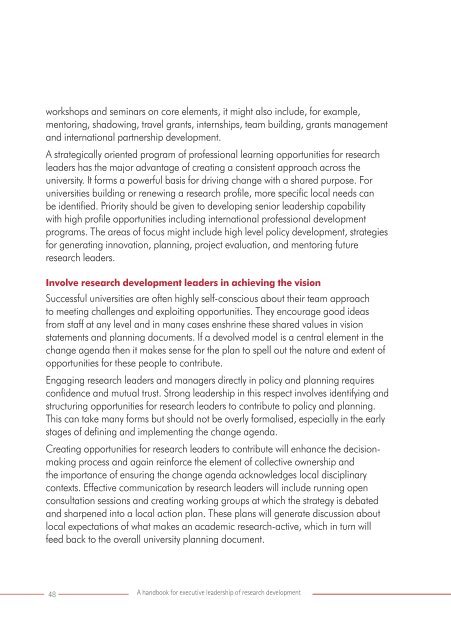handbook-executive-leadership-of-research-development-pdf-v10
handbook-executive-leadership-of-research-development-pdf-v10
handbook-executive-leadership-of-research-development-pdf-v10
You also want an ePaper? Increase the reach of your titles
YUMPU automatically turns print PDFs into web optimized ePapers that Google loves.
workshops and seminars on core elements, it might also include, for example,mentoring, shadowing, travel grants, internships, team building, grants managementand international partnership <strong>development</strong>.A strategically oriented program <strong>of</strong> pr<strong>of</strong>essional learning opportunities for <strong>research</strong>leaders has the major advantage <strong>of</strong> creating a consistent approach across theuniversity. It forms a powerful basis for driving change with a shared purpose. Foruniversities building or renewing a <strong>research</strong> pr<strong>of</strong>ile, more specific local needs canbe identified. Priority should be given to developing senior <strong>leadership</strong> capabilitywith high pr<strong>of</strong>ile opportunities including international pr<strong>of</strong>essional <strong>development</strong>programs. The areas <strong>of</strong> focus might include high level policy <strong>development</strong>, strategiesfor generating innovation, planning, project evaluation, and mentoring future<strong>research</strong> leaders.Involve <strong>research</strong> <strong>development</strong> leaders in achieving the visionSuccessful universities are <strong>of</strong>ten highly self-conscious about their team approachto meeting challenges and exploiting opportunities. They encourage good ideasfrom staff at any level and in many cases enshrine these shared values in visionstatements and planning documents. If a devolved model is a central element in thechange agenda then it makes sense for the plan to spell out the nature and extent <strong>of</strong>opportunities for these people to contribute.Engaging <strong>research</strong> leaders and managers directly in policy and planning requiresconfidence and mutual trust. Strong <strong>leadership</strong> in this respect involves identifying andstructuring opportunities for <strong>research</strong> leaders to contribute to policy and planning.This can take many forms but should not be overly formalised, especially in the earlystages <strong>of</strong> defining and implementing the change agenda.Creating opportunities for <strong>research</strong> leaders to contribute will enhance the decisionmakingprocess and again reinforce the element <strong>of</strong> collective ownership andthe importance <strong>of</strong> ensuring the change agenda acknowledges local disciplinarycontexts. Effective communication by <strong>research</strong> leaders will include running openconsultation sessions and creating working groups at which the strategy is debatedand sharpened into a local action plan. These plans will generate discussion aboutlocal expectations <strong>of</strong> what makes an academic <strong>research</strong>-active, which in turn willfeed back to the overall university planning document.48 A <strong>handbook</strong> for <strong>executive</strong> <strong>leadership</strong> <strong>of</strong> <strong>research</strong> <strong>development</strong>



